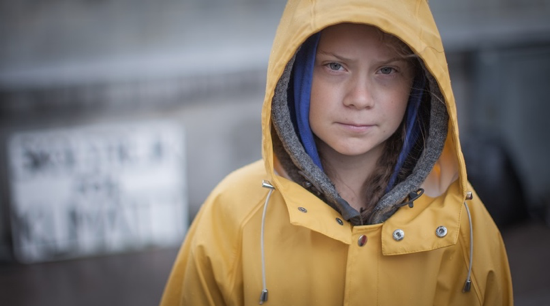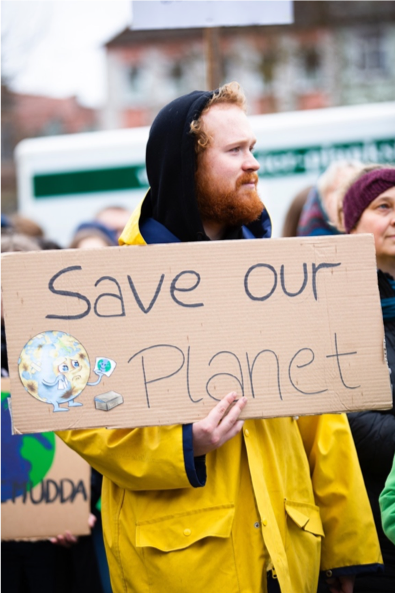Youth Find Voice and Hope through Activism
Figure 1 Greta Thunberg, outside the Swedish parliament. Photo by Anders Hellberg
By Helga Luest
As a 15-year-old activist, Greta Thunberg rocked the global stage at the United Nations plenary in Katowice, Poland. Her message was simple: “You only talk about moving forward with the same bad ideas that got us into this mess. Even when the only sensible thing to do is pull the emergency brake, you are not mature enough to tell it like it is. Even that burden you leave to us children.” Greta was speaking about climate change just as youth throughout Europe were walking out of classrooms to demand climate change action by global leaders.
Laws, Rights, and Climate Change
Climate change and the rights of nature are increasingly a hot button of activism for youth. They realize that with global warming, the threat is greatest to their generation and those to come – yet most governments do not consider the commanding voice of children. They don’t vote, they don’t have money, and they don’t have power. But all of that could be changing, as the collective impact, media visibility, and support from adult advocates elevates their voices to the national and international platforms. Globally, youth are outraged by the inaction that threatens our planet, biodiversity, and life itself.
Kids are standing with nature to be heard, valued, and protected. In the United States, Juliana v. United States marks the first lawsuit of its kind where 21 children banded together saying that inaction by the government is violating and denying their right to a safe and stable climate. Some face losing their homes as result of rising sea levels, while others see the contamination of air and water quality that creates disproportionate health risks and damages the place they call home. There are a number of other climate change lawsuits underway, and at the county and state levels, communities are seeking “public nuisance” damages from coal, gas, and oil companies for contributing to climate change.
There are other impactful legal efforts underway. Earth Law Center (ELC) holds that if Nature has rights, then these rights can be protected by law and defended in courts. ELC works together with local environmental groups to secure rights for specific ecosystems and species, as well as writing and submitting amicus briefs, researching and advising on the different pathways to rights recognition, and getting the word out to a broader audience. Current programs focus on river and land rights and oceans and coasts. Advocacy efforts also promote the inclusion of earth law in law schools by writing the first Earth Law legal textbook. ELC also piloted mock trial workshops in partnership with the Brooklyn College Community Partnership, part of a larger drive to bring Earth Law to middle and high school students. And once students get it and start to understand that what they say and do makes a difference, they stick with it. ELC sees that first-hand with dozens of summer interns who continue to support the mission long after school resumes; some for years.
Public Opinion is Shifting
While youth rise up and take action and learn more about our changing world, adults are also taking notice. The wrath of nature’s brutal storms continue to intensify because of human consumption and carbon emissions, and it has become nearly impossible for most to ignore that climate change is happening. According the January 2019 Climate Change in the American Mind survey produced by Yale and George Mason University, 70 percent of Americans. That was a jump of seven percent in just nine months. This may largely be attributed to the massive floods, wildfires, and severe storms, the likes of which we have never seen before.
In many ways, money still talks louder than Mother Nature. It's a primary driver for our policymakers – the power and influence of industry, and typically those that put our environment at greatest risk. Yet, our electeds want to maintain their power and influence, so they compromise to ensure endorsements and campaign donations. For this reason alone, climate change should be a significant motivator for campaign reform, pulling the rug out from under the dirty fossil fuel industries. There’s a reason why the National Climate Assessment in the United States and the Intergovernmental Panel on Climate Change reports in 2018 were addressed to policymakers – because they can make the needed bold decisions in the shortest amount of time.
There is no doubt that 2020 could be the most important election year ever in the United States. With the increased awareness in the general public, everyone should be voting like life depends on it – because it does. There is no room for climate denial.
While policy and politics prompt adults to flock to the polls, youth too young to vote find a place for their voices through collective action. And while youth may not be of voting age yet, there is a lot they can do to influence how things look in the future and how they manage the associated stresses. They use their numbers, actions, and arguments to force these issues to the headlines and the forefront of legislative agendas.
Life, Liberty, and Mental Health for Youth
Issues such as gun violence and climate change have heightened youth stress and prompted brave civic protest. What adults once took as a given – being safe at school and existing on a livable planet – are now at risk. The looming threats have had a significant impact on kids. According to a recent study by the Pew Research Center, 96 percent of teens felt that anxiety and depression were a problem and 70 percent felt it was a major problem.
According to The Lancet’s Planetary Health publication, climatological factors should be considered when assessing the mental health of children. Extreme weather events like intense precipitation, tropical cyclones, wild fires, heat stress, and other shifts not only pose risks to health, but to societal and economic aspects of life as well. New terms like eco anxiety and solastalgia help to explain some of the heavy feelings that are associated with climate change.
Social determinants of health are not stable for kids and will continue to experience volatility because of climate change. The science of climate change tells us that where it is warm, it will get warmer; and where it is wet, it will get wetter. Nobody will escape the negative impacts of heat extremes, floods, and severe weather.
The wealth of a national may also predict future suffering, with many indications that developing nationals will be the most vulnerable to catastrophic events. The stress and environmental changes have had an impact on kids where depression rates and suicidal ideation are on the rise.
Figure 2 Photo by Markus Spiske on Unsplash
The Healing Powers of Activism
So how does activism really make a difference for youth? Well, there’s no doubt that being subject to many world pressures, combined with abuse, neglect, and other tragic experiences – also known as adverse childhood experiences (ACEs), can present real struggles for kids. This makes it especially important for youth to feel heard, appreciated, and included so that hope and optimism supersede the weight of the world. And activism does have a positive effect on mental health and self-esteem for a number of reasons.
Action Sparks Hope – By shifting both your view and your experience from what is happening to you to what you can do about it, you move from passive to active. Doing something positive with how you feel – like advocating for positive change – will bring about an inherent hope and a more optimistic view of the future.
Strength in Numbers – Most life challenges are easier to manage with the support of others, especially in situations that are heavy, depressing or complicated. In collective activism, teens are able to connect with other passionate, like-minded peers with whom they can work to have big picture impact. The mere action of working and connecting with others works to counter the depression and lowered self-esteem that may result from isolation.
Results Affirm Action – When one school experiences a walk out, it usually doesn’t become national news, but when hundreds of schools experience this, it is international news. The large-scale and coordinated action not only raises attention, it also stimulates real action by leaders who can change rules and laws. With every success, youth feel an affirmation that their hard work has paid off, their voices matter and they are making a difference!
As climate change concerns demand action and social change, youth need to be empowered to lead with their passion, conviction, and unhampered will. They should have a place at the table when community leaders talk about climate change, adaptation, and resilience planning – because they will be the most impacted by the decision or indecision that takes place today. When given the space to take bold steps forward, they not only preserve their right to a healthy future, they also build skills to support resilience.
Join the movement today by:
Signing up for ELC’s newsletter
Helga Luest, M.A., is a senior communications professional who is certified in climate change and health from the Yale School of Public Health. She recently joined the Climate Reality Leadership Corps


